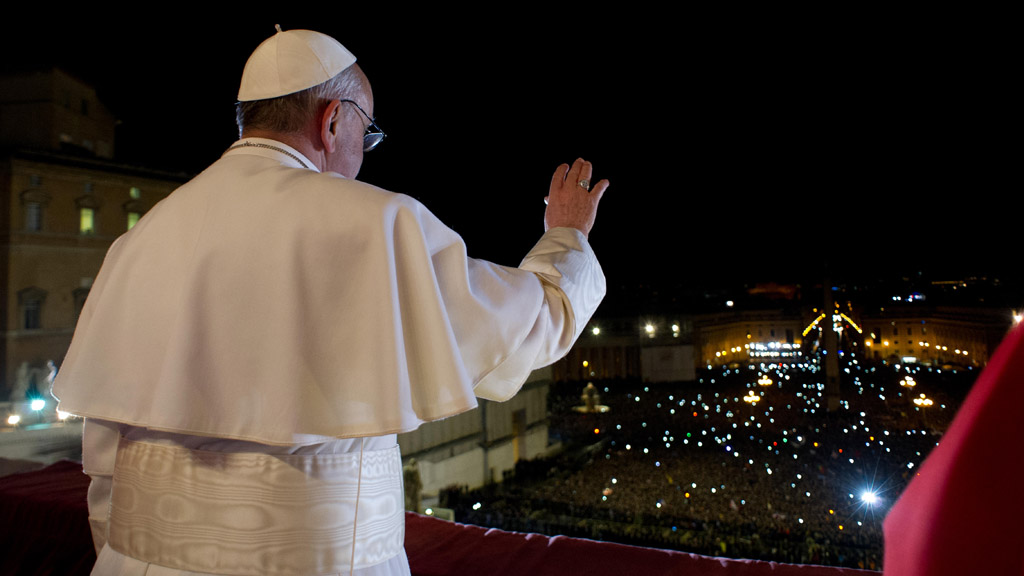In the papal in-tray: child abuse, celibacy, militant Islam
Allegations of corruption within the church, child abuse scandals, priestly celibacy, and the rise of militant Islam – just some of the major issues confronting Pope Francis as he begins his papacy.

Last night Pope Francis stepped on to the balcony of St Peter’s basilica to cheers of joy and shouts of “Viva il papa!”, writes Abigail Frymann, The Tablet’s online editor. However, it will not be long before he has to face a bulging in-tray and myriad demands for his attention.
First of all, for a church that has been hit by variety of scandals, is a need to restore trust. Pope Francis has been left a top secret report that Benedict XVI commissioned from a trio of elderly cardinals, which investigated what lay behind the “VatiLeaks” scandal, involving information leaked by the Pope Emeritus’ butler, who was jailed for passing confidential papal papers to a journalist.
The Italian papers alleged that it was the contents of the report – which claimed there was a gay network in the Vatican that was being blackmailed by outsiders – and not ill health, that prompted Benedict to resign. The former Pope announced in his last week of office that he was making the contents “available exclusively to the new pontiff”.
Uphill struggle
Whatever the precise contents of the report, Francis is faced with an uphill struggle in restoring the credibility of the church. Catholics have felt let down by tales of abuse and corruption bleeding from the higher echelons of their church. There have also been questions about transparency at the Vatican Bank, although Benedict XVI appointed a new head of the bank in February.
The new pope will be expected to take a very tough approach on abuse and clerical cover-ups in every corner of the clergy.
In addition, stories of horrific child abuse by priests keep coming to light. Only on Tuesday, a day before Francis was elected, the archdiocese of Los Angeles agreed a US$10m settlement with four men who were abused as boys. This was just the latest in a series of abuse scandals to rock the international church. The new pope will be expected to take a very tough approach on abuse and clerical cover-ups in every corner of the clergy.
Francis is known to be strong on governance, which is to be welcomed as he is likely to need to take a stiff broom to the curia – the faction-riven Vatican bureaucracy – which has been accused of blocking attempts by Benedict XVI to enact greater change. He has never worked in the curia so he will need to find advisors he can trust to him.
Longer-term issues
The church is facing longer-term issues as well, not least that in the west the esteem and influence it once enjoyed is being eroded, challenged by at times rapid secularisation. The new Pope will have to decide how he is to reach out to those who, for whatever reason, have left Christianity behind, and what sort of approach to adopt when governments press ahead with legislation the church fiercely opposes, such as gay marriage or abortion.
The chronic shortage of priests in Europe and north America will soon hit crisis point as the current reliance on clerics approaching – or already into – their retirement becomes unsustainable. The challenge will be to encourage more men to join the priesthood – an issue some Catholics believe could be solved by abolishing compulsory celibacy for priests.
In parts of Africa, the Middle East and Asia the church has been deeply concerned by the rise of militant Islam. Attacks on Christians and churches in Nigeria and Pakistan have become all too common. In Iraq and Syria, to name just two countries, hundreds of thousands of Christians have fled to start new lives in other countries in the past 10 years as they have found themselves caught up in conflict or overtly persecuted.
The chronic shortage of priests in Europe and north America will soon hit crisis point as the current reliance on clerics approaching – or already into – their retirement becomes unsustainable.
Francis will need to look for ways to support persecuted Christian minorities, and he will doubtless share his predecessor’s concern that these communities, which in the Middle East date back centuries, are not eradicated. At the same time, he will need to keep developing the church’s relations with other faiths.
How to reform?
A challenge to the Catholic church in Latin America, and therefore one with which Pope Francis will be familiar, is the rise of Pentecostalism. Regionally it has led millions of cradle Catholics to leave the Church of their upbringing for an expression of Christianity that appears livelier and less judgemental.
Many Catholics around the world, lay or ordained, agree that the church needs to reform in order to become stronger and avoid any more scandals and troubles of the sort it has faced recently: the question is how to enact that reform.
At the pre-conclave discussions last week, cardinals were citing evangelisation, increasing the role of bishops, and encouraging vocations as solutions. On the ground, lay Catholics see solutions in, for example, the church becoming more transparent, allowing married priests, giving women a greater role or listening to lay people more.
Pope Francis will somehow need to reconcile these two viewpoints if he is to harness the desire of both the laity and the ordained to see their church healthy and flourishing.
Abigail Frymann is online editor with the international Catholic publication, The Tablet